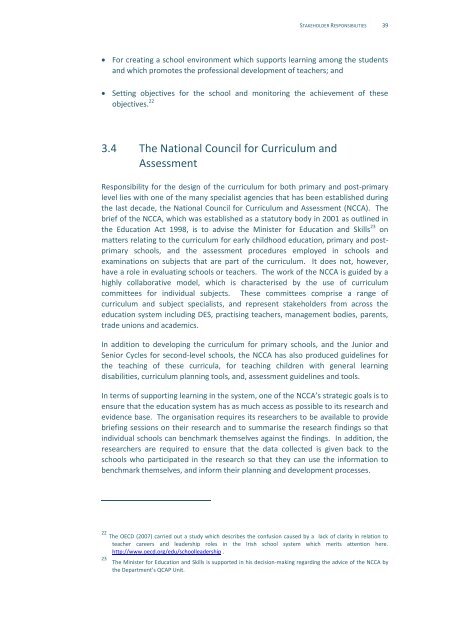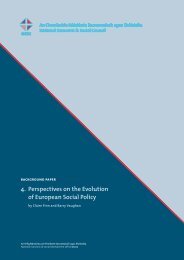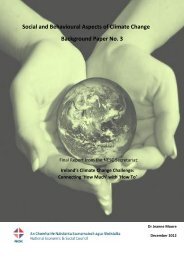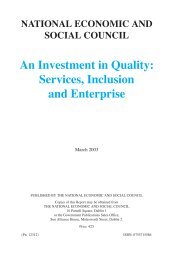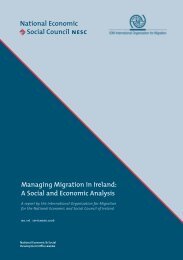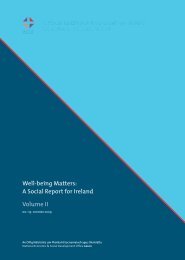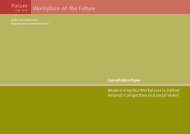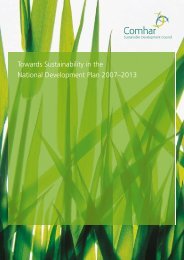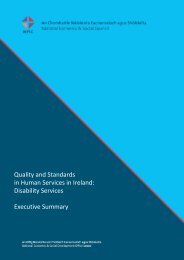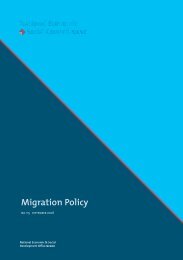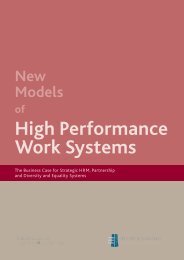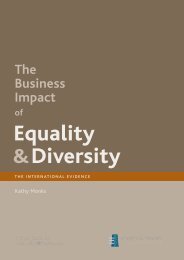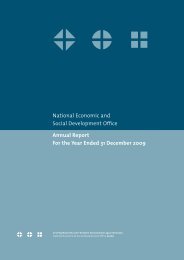Quality and Standards in Human Services in Ireland - the NESC ...
Quality and Standards in Human Services in Ireland - the NESC ...
Quality and Standards in Human Services in Ireland - the NESC ...
Create successful ePaper yourself
Turn your PDF publications into a flip-book with our unique Google optimized e-Paper software.
STAKEHOLDER RESPONSIBILITIES 39 For creat<strong>in</strong>g a school environment which supports learn<strong>in</strong>g among <strong>the</strong> students<strong>and</strong> which promotes <strong>the</strong> professional development of teachers; <strong>and</strong> Sett<strong>in</strong>g objectives for <strong>the</strong> school <strong>and</strong> monitor<strong>in</strong>g <strong>the</strong> achievement of <strong>the</strong>seobjectives. 223.4 The National Council for Curriculum <strong>and</strong>AssessmentResponsibility for <strong>the</strong> design of <strong>the</strong> curriculum for both primary <strong>and</strong> post-primarylevel lies with one of <strong>the</strong> many specialist agencies that has been established dur<strong>in</strong>g<strong>the</strong> last decade, <strong>the</strong> National Council for Curriculum <strong>and</strong> Assessment (NCCA). Thebrief of <strong>the</strong> NCCA, which was established as a statutory body <strong>in</strong> 2001 as outl<strong>in</strong>ed <strong>in</strong><strong>the</strong> Education Act 1998, is to advise <strong>the</strong> M<strong>in</strong>ister for Education <strong>and</strong> Skills 23 onmatters relat<strong>in</strong>g to <strong>the</strong> curriculum for early childhood education, primary <strong>and</strong> postprimaryschools, <strong>and</strong> <strong>the</strong> assessment procedures employed <strong>in</strong> schools <strong>and</strong>exam<strong>in</strong>ations on subjects that are part of <strong>the</strong> curriculum. It does not, however,have a role <strong>in</strong> evaluat<strong>in</strong>g schools or teachers. The work of <strong>the</strong> NCCA is guided by ahighly collaborative model, which is characterised by <strong>the</strong> use of curriculumcommittees for <strong>in</strong>dividual subjects. These committees comprise a range ofcurriculum <strong>and</strong> subject specialists, <strong>and</strong> represent stakeholders from across <strong>the</strong>education system <strong>in</strong>clud<strong>in</strong>g DES, practis<strong>in</strong>g teachers, management bodies, parents,trade unions <strong>and</strong> academics.In addition to develop<strong>in</strong>g <strong>the</strong> curriculum for primary schools, <strong>and</strong> <strong>the</strong> Junior <strong>and</strong>Senior Cycles for second-level schools, <strong>the</strong> NCCA has also produced guidel<strong>in</strong>es for<strong>the</strong> teach<strong>in</strong>g of <strong>the</strong>se curricula, for teach<strong>in</strong>g children with general learn<strong>in</strong>gdisabilities, curriculum plann<strong>in</strong>g tools, <strong>and</strong>, assessment guidel<strong>in</strong>es <strong>and</strong> tools.In terms of support<strong>in</strong>g learn<strong>in</strong>g <strong>in</strong> <strong>the</strong> system, one of <strong>the</strong> NCCA’s strategic goals is toensure that <strong>the</strong> education system has as much access as possible to its research <strong>and</strong>evidence base. The organisation requires its researchers to be available to providebrief<strong>in</strong>g sessions on <strong>the</strong>ir research <strong>and</strong> to summarise <strong>the</strong> research f<strong>in</strong>d<strong>in</strong>gs so that<strong>in</strong>dividual schools can benchmark <strong>the</strong>mselves aga<strong>in</strong>st <strong>the</strong> f<strong>in</strong>d<strong>in</strong>gs. In addition, <strong>the</strong>researchers are required to ensure that <strong>the</strong> data collected is given back to <strong>the</strong>schools who participated <strong>in</strong> <strong>the</strong> research so that <strong>the</strong>y can use <strong>the</strong> <strong>in</strong>formation tobenchmark <strong>the</strong>mselves, <strong>and</strong> <strong>in</strong>form <strong>the</strong>ir plann<strong>in</strong>g <strong>and</strong> development processes.22 The OECD (2007) carried out a study which describes <strong>the</strong> confusion caused by a lack of clarity <strong>in</strong> relation toteacher careers <strong>and</strong> leadership roles <strong>in</strong> <strong>the</strong> Irish school system which merits attention here.http://www.oecd.org/edu/schoolleadership .23The M<strong>in</strong>ister for Education <strong>and</strong> Skills is supported <strong>in</strong> his decision-mak<strong>in</strong>g regard<strong>in</strong>g <strong>the</strong> advice of <strong>the</strong> NCCA by<strong>the</strong> Department’s QCAP Unit.


